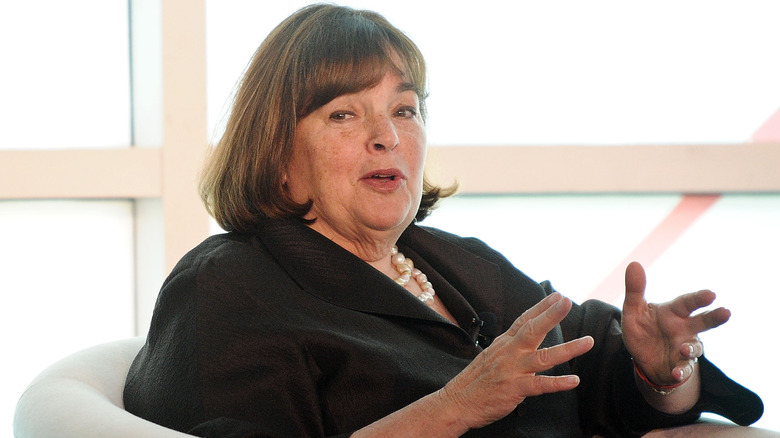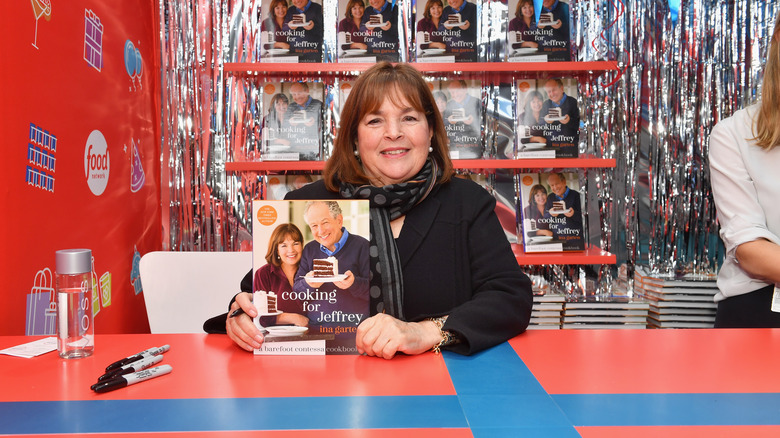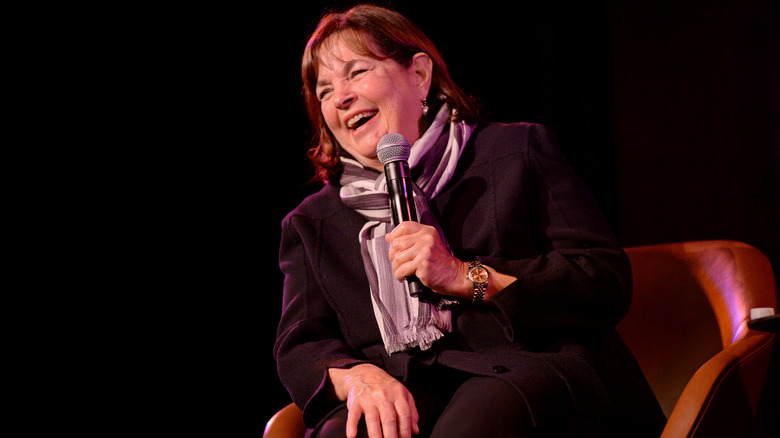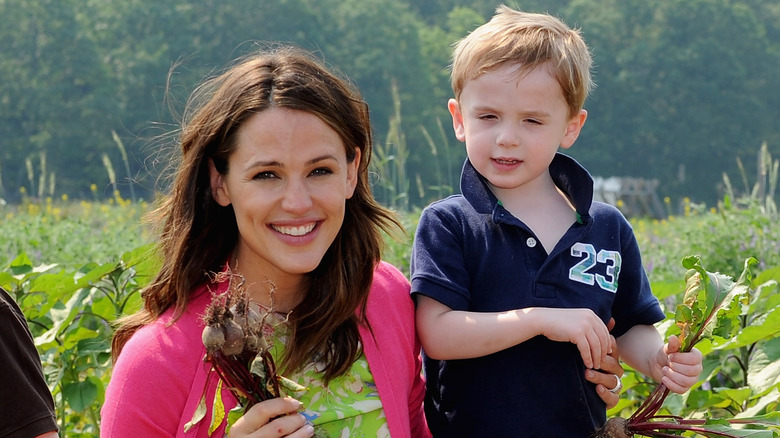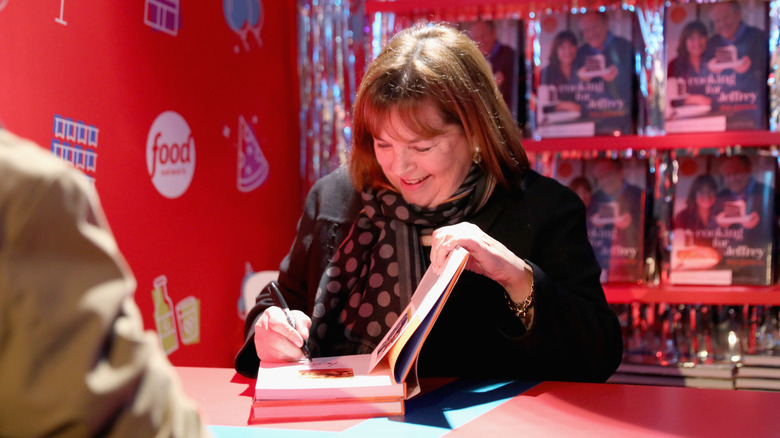The 6 Biggest Revelations From Ina Garten's New Memoir
We may receive a commission on purchases made from links.
Ina Garten's cookbooks are a staple in our kitchens. We've long admired her recipes for being easy, tasty, and approachable, as have the countless home cooks who've been drawn to her recipes, that can be pulled off in a pinch. There was something undeniably different about Garten when her cooking show, "The Barefoot Contessa," launched onto the scene in the midst of Martha Stewart's heyday. Where Stewart's show was polished to perfection, Garten's was organic and relatable to the average American. Cameras followed her to the store to shop for ingredients, and she'd taste her food while she made it on camera. She has a way of making delicious home-cooked meals accessible and palatable to those who may have thought, "I could never do that," when watching Stewart's flawless, refined approach to cooking.
Though Garten is by no means new to the publishing world (having a whopping 13 cookbooks in her repertoire), her new book, "Be Ready When The Luck Happens," marks the first time the chef, television personality, and author has given a full, personal written account of the details of her life and career. We jumped at the chance to take an inside look at her story, and were pleased to find that Garten's long-awaited memoir is like her recipes: Engaging, accessible, and effortlessly enjoyable. Reading it makes her feel like a long-time, intimate friend — and some of the things we learned genuinely surprised us.
She survived a traumatic childhood
Given Ina Garten's natural talent in the kitchen and effortlessly warm personality, it would be easy to assume these were traits she saw throughout her childhood. But the raw, hard truth we learned in Garten's memoir is that her childhood was far from ideal. She holds nothing back when detailing the emotionally neglectful, abusively rigid childhood she suffered, which makes it all the more admirable that she fought her way to attain her current success.
From early childhood, Garten's parents imposed a singular purpose on her: To achieve. She discusses the lack of play present in her childhood, saying she didn't have toys that weren't in some way educational (except for a beloved tea set from her great-uncle). She also notes that neither she nor her brother remember ever being in each other's rooms, because they were always sequestered away doing homework. Worse than the constant pressure to accomplish and achieve, though, were the consequences if she didn't. Garten details the temper tantrums and harsh punishments meted out by her father when she fell short of his expectations, saying, "He'd hit me or pull me around by my hair." She also says her parents held her to impossibly high standards without believing she could meet them, and she's had to spend much of her adulthood grappling with the feeling of not being good enough.
Garten was separated from her husband
To onlookers, Ina and Jeffrey Garten's relationship may look ideal — the two are frequently seen enjoying time together, and the love between them over their 55+ years together is tangible. Like other aspects of her life, however, achieving a successful, happy marriage took a lot of hard work, and there was much adversity along the way. In fact, the two spent much of their marriage in physically separate locations due to career differences, and for a time, Garten and her husband were actually separated.
In her memoir, Garten details that she married her now-husband Jeffrey when she was in college. He ended up "parenting" her in a way that she needed (given her neglectful childhood), but also in a way that wasn't sustainable. When Garten bought her first food store, The Barefoot Contessa, she felt an urgent need to discover herself in her own way, without the guidance of a partner. The couple wasn't new to physical distance — after all, Jeffrey spent time in the military — but Ina needed more, and advocating for it was scary. She doesn't regret the temporary separation, though. To fans who idealize her marriage, she says, "The crisis was real, and we could have made a terrible mistake. Instead, we listened to each other, changed the things that caused our unhappiness, and ended up with a much stronger relationship."
She spent a summer living a nomadic lifestyle in Europe
Early on in their relationship, Ina and Jeffrey Garten found themselves with a rare few months of no military or school obligations during one summer in the early '70s. The couple, young and adventurous, decided to spend that time frolicking around Europe on a budget. They allotted themselves five dollars per day and committed to renting a car and camping their way through various parts of the European countryside. France, in particular, was revelatory for Garten — so much so that she would later purchase and renovate an apartment in Paris.
Garten says that on her whimsical summer, she and her husband gave themselves full reign to explore the continent to their heart's content, and she felt a particular kinship with France upon arrival. This is also one of the first times in the memoir we see Garten developing a passion for food. In particular, she took great delight in visiting the open-air markets where French locals bought their groceries. In doing so, she discovered an appreciation for the seasonality of produce, and the way simple techniques could produce such complex flavors. She also mentions falling in love with baguettes at local boulangeries — discoveries fostered by a beautiful summer where the only job she had was to travel and enjoy life.
Her septic tank exploded while filming her first show
Ina Garten seems a natural in front of the camera, so we wouldn't blame you for thinking that all her television appearances went off without a hitch. What she details in her memoir, however, is the horror show that her first few television appearances brought upon her household. In fact, the filming was such an ordeal that she rejected the whole thing and vowed to quit television.
Garten details the nail in the coffin for that first television production, which was being filmed in her small two-bedroom home by a fifty-person crew. This meant fifty people using her amenities including, yes, the bathroom. She mentions how her septic system finally called it quits, and says that sewage "started bubbling up in the middle of my lawn." The truck that came to rectify the problem got stuck in the "mud" of her lawn and left huge tire tracks upon pulling away, and the show's director was so stressed that she vomited in the garden. The next morning, Garten said she was done with filming, and dismissed the entire crew, swearing that she'd never do another show.
Despite this promise to herself (and largely thanks to the persistence of Food Network executive Eileen Opatut), Garten eventually ended up filming "Barefoot Contessa" — this time with a much smaller crew. She also had a free way out if she wasn't happy with the show after its first 13 episodes, which gave her the security she needed to give television another try.
Her assistant dismissed a letter from Jennifer Garner
As with everything Ina Garten does, authenticity down to the tiniest details was central to her show, "Barefoot Contessa." She insisted that, when hosting guests in her episodes, they must be her actual friends in real life — people she would regularly invite over to her dinner parties. Naturally, the success of "Barefoot Contessa" catapulted her into the wider public eye, and found celebrities of all kinds inquiring about being a guest star on the show (before Garten started hosting "Be My Guest").
Garten's assistant and dear friend, Barbara, came to her one day to admit that she had dismissed a letter from Jennifer Garner, because she didn't know who the actress was. Her dismissal was polite, saying that Garten's actual friends are the guests in the show. However, Garten admits to having had an "instinct" about Garner as being a kindred spirit, and later invited the actress to film a Los Angeles episode of the show. That was the beginning of what would become a beautiful friendship rooted in food and authenticity. Garten even briefly mentions her experience at Garner's 40th birthday party, which saw all of Garner's real-life friends, "wearing their sweats, ponytails, and no makeup." The pair have remained good friends ever since.
Her vision of The Barefoot Contessa Cookbook almost didn't happen
If there's one thing Ina Garten is to be applauded for, it's following her instincts throughout her life and career. Her show is so relatable because she fought for the ability to be her authentic self in front of the camera. Similarly, her cookbooks are accessible because she fought for them to have casual, relatable appeal — to the extent that she took a huge risk with her first cookbook.
After she finished writing her debut book, Garten sent a copy to her editor to begin the design work. Though she had a very specific vision for how she wanted the book to look, she found herself swiftly shut out of the process of designing it. When she received the first copy, it was nothing like what she had envisioned. In her words, "When I finally saw the layout, I hated it." She had written this book to tell her story, with details about her first shop and her journey discovering her love of food. Instead, what she held in her hands was an impersonal, albeit very picturesque, cookbook. Garten fought to have the design changed, and she won, but she was taking a chance in doing so. Nothing like her cookbook existed on the market, and nobody was sure if it would sell. Fortunately, her gamble paid off, and "The Barefoot Contessa Cookbook" sold over 100,000 copies in its first year.

